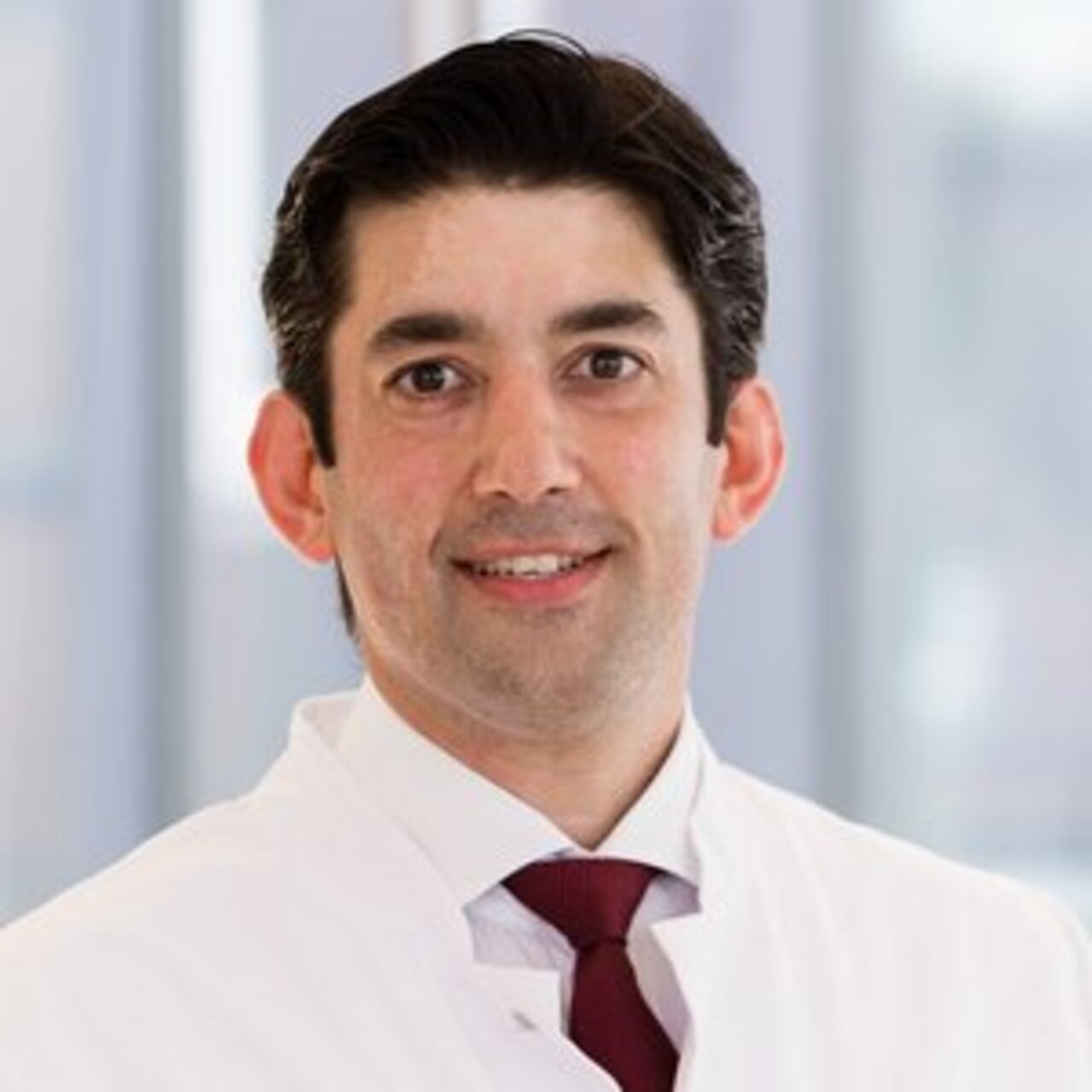Specialists in Valvular Heart Defect
8 Specialists found
Dr Brunilda Alushi, PhD, FEACVI
Internal Medicine and Cardiology, Prevention and Imaging Diagnostics
Munich
Information About the Field of Valvular Heart Defect
Valvular heart defects often remain undetected for a long time. They often develop slowly due to natural wear. But, young patients can also be affected - for example, from a bacterial disease or after a heart attack. In any case, valvular heart defects should be taken seriously and treated to prevent further damage to the heart.
Which Heart Valves Are There?
Our heart is about the size of a fist and sits under our sternum. At rest, it beats about 60 times per minute and pumps about 5,000 liters of blood through our body every day - during exercise, it can be as much as 10,000 liters or more.
The heart consists of four heart chambers - two anterior and two main chambers. Each of their entrances and exits is equipped with heart valves, ensuring that the blood can only circulate in the flow direction. The valve at the exit of the heart to the large circulation is the aortic valve. The pulmonary valve is located at the exit in the direction of the lungs. The mitral valve is on the left side and the tricuspid valve on the right side between the atriums and the main chambers.
Which Valvular Heart Defects Can Occur?
In principle, any heart valve can become diseased. However, the most common valvular heart defects are aortic valve stenosis and mitral valve insufficiency. Aortic stenosis is one of the most common valvular heart defects in the western world and occurs mainly in older patients. Other valvular heart defects are:
- Aortic valve insufficiency
- Mitral valve stenosis
- Mitral valve prolapse
- Pulmonary valve stenosis or insufficiency
- Tricuspid valve stenosis or insufficiency
The Difference Between Heart Valve Stenosis and Insufficiency
Valvular heart defects can be differentiated into stenoses and insufficiencies. In cardiac valve stenosis, a narrowing occurs due to deposits or scarring. As a result, the blood can no longer flow freely, and the heart has to pump against this narrowing. The valve is considered insufficient when it no longer closes sufficiently to allow the blood to flow back.
What Are The Causes of Valvular Heart Defects?
In rare cases, valvular heart defects are congenital. A minimal number is even discovered in the womb. To what extent these defects are genetically determined or arise during embryonic development has not yet been conclusively clarified scientifically. Some congenital heart defects are not noticed immediately after birth, but in later years, which is often incidental during a routine examination or when the first symptoms are noticed.
Most valvular heart defects, however, develop in the course of life and have other causes, such as:
- Age-related heart valve calcification
- Dilatation of the ventricles or the aorta
- Bacterial infections and chronic inflammation
- Heart tumors
Symptoms of Valvular Heart Defects
Not every malfunction of the heart valves leads directly to specific symptoms. Sometimes the defects remain undetected for a long time, sometimes up to decades, in extreme cases until the heart finally suffers severe damage. The following symptoms can be an indication of a valvular heart defect and should be clarified by a physician:
- Shortness of breath
- Decreasing performance
- Heart pain
- Cardiac arrhythmias
- Dizziness
- Fainting
- Water retention
- Blue lips (cyanosis)
- Weight Loss
How is a Valvular Heart Defect Diagnosed?
Well-trained cardiologists can sometimes notice defective valves simply by the cardiac murmur. The most common diagnostic procedure is the examination with a so-called Doppler ultrasound, which helps to identify the size of the heart and chambers and the thickness of the cardiac walls. It must be assessed whether the valves are moving and closing correctly.
The cardiologist can also display the heart’s blood flow in color images and with the acoustic flow sound, which allows reliable diagnosing of even complex heart valve defects. A cardio MRI can also be used to assess the functionality of the valves. For specific detailed examinations, a cardiac catheter is recommended in rare cases.
Valvular Heart Defect Treatment & Surgery
Drugs can help improve and support the heart's pressure conditions and the flow properties of the blood to relieve the heart. However, the actual cause, the malfunction of the valve, cannot be remedied by medication.
Only a surgical procedure can help. Nowadays, some valvular heart defects can be replaced by a heart catheter or minimally invasive without extensive heart surgery. Some surgical procedures for valvular heart defects are briefly presented below.
- Heart valve reconstruction: the damaged heart valve is repaired during surgery. Detailed information on heart valve reconstruction can be found here.
- Heart valve replacement: the damaged heart valve is replaced. Mechanical heart valves and biological heart valves are available.
- Balloon valvuloplasty: a procedure used to treat mitral and pulmonary stenosis with the help of heart catheters. A balloon dilates the narrowing, and deposits are blown away.
- Transcatheter aortic valve implantation (TAVI): for this replacement procedure, the access is made either via the groin or the cardiac apex. TAVI can be used in older patients for whom major heart surgery would be too risky.
- Mitral clip for mitral valve insufficiency: mitral clip placement is a minimally invasive reconstructive procedure. A catheter is used to forward the mitral clip through the groin to the left heart to restore the leaking mitral valve's function.
When Should a Valvular Heart Defect Be Treated with Surgery?
Surgical treatment for defective heart valves is used earlier today, even if the valves cause few or no symptoms. The aim is avoiding permanent heart damage and prolonging life expectancy. Progress in heart valve reconstruction and the replacement of defective valves have been rapid in recent years. Intensive research is ongoing to be able to carry out more minimally invasive heart valve surgeries. If you are affected, please consult a cardiologist or heart surgeon for detailed advice.
What Should Be Considered After a Heart Valve Surgery?
Regardless if an artificial heart valve or prosthesis is used - strict endocarditis prophylaxis must always be maintained after a heart valve surgery. Scarring causes swirling of the blood in the heart, which increases the risk of bacteria settling and leading to inflammation. Under certain circumstances, this can have fatal consequences for the heart. For this reason, antibiotics must be taken as a precaution or promptly as a preventive measure before surgeries, treatments in the oral cavity (e.g., dental prophylaxis), and in the case of bacterial infections.
How Resilient Will I Be After the Surgery?
After successful heart valve reconstruction, the patient is usually not restricted, fully able to work under stress, and can even participate in competitive sports. Regular ultrasound checkups should be carried out to maintain this state.
Even after a valve replacement, most patients are entirely able to work under stress. Endurance sports are often even recommended for a positive course, but patients should refrain from competitive sports. How much is advisable will be determined by the treating physician. For patients with an artificial valve, blood-thinning medication is usually necessary, which is not when a bioprosthesis was used.
Which Doctors and Clinics Are Specialized in Valvular Heart Defects?
Every patient who needs a new heart valve wants the best medical care. Therefore, the patient is wondering where to find the best clinic for heart valve surgery.
As this question cannot be answered objectively, and a reliable doctor would never claim to be the best one, we can only rely on the doctor’s experience. The more heart valve surgeries have been carried out, the more experienced the doctor becomes.
Specialists in heart valve reconstruction or heart valve replacement are cardiologists who have specialized in treating valvular heart defects. Due to their yearlong experience as cardiologists or cardio surgeons focusing on valvular heart defect surgery, they are the right professionals to contact for a heart valve surgery.
Sources:
http://www.herzstiftung.de/pdf/klappenfehler_10_diagnose.pdf
Herzklappenerkrankungen heute, Sonderband der Deutschen Herzstiftung, S. 4ff.




![[Translate to English:] PD Dr. med. El-Essawi - Portrait [Translate to English:] PD Dr. med. El-Essawi - Portrait](/fileadmin/_processed_/e/0/csm_El-Essawi-Portrait_977dc73321.jpg)



